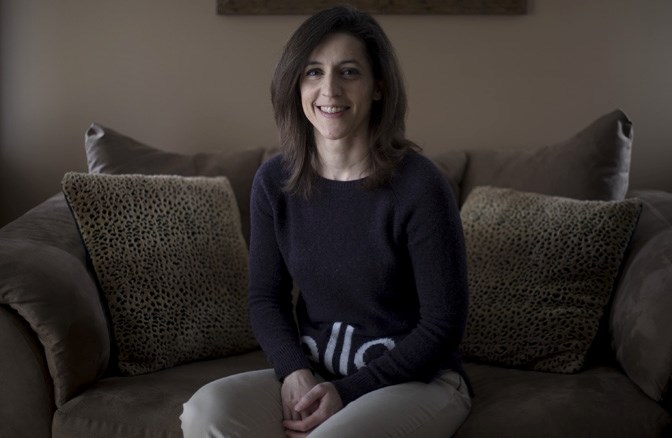An Okotoks woman who spent the past decade dealing with chronic liver disease hopes National Liver Health Month will raise awareness of hepatology and the importance of organ donation.
Anne-Marie Cotton was diagnosed in 2006 with primary sclerosing cholangitis (PSC), an autoimmune disease that attacks the bile ducts in the liver, causing the ducts to become inflamed, scar and close off. Eventually bile can’t escape the liver anymore, causing further scarring and inflammation, leading to cirrhosis.
“It’s different for everybody,” said Cotton. “A lot of times people have lots of symptoms, sometimes people have no symptoms. Some people get diagnosed and never ever need a transplant because they can have it for 20 or 30 years, and other people get diagnosed and transplanted within a year.”
Though the disease itself is rare, about 80 per cent of those who suffer from PSC also have some sort of inflammatory bowel disease like Crohn’s or colitis, she said. Cotton had been diagnosed with Crohn’s before learning she had PSC.
She knew something was wrong when she was overly exhausted. For months she assumed she was tired because she was chasing her then-two-year-old son around and had just dealt with the stress of relocating to Okotoks.
“I think the moment was, I was carrying laundry up the stairs, and I got to the top and I just had to put it down because I was so tired,” said Cotton. “So I thought, ‘Something’s got to be wrong.’”
New to town and without a doctor, Cotton saw the first family physician who was accepting new patients. She was told everything was fine and her exhaustion was likely due to depression. He also mentioned that her liver enzymes were elevated, she said.
Cotton decided to get a second opinion. The next doctor referred her back to the gastroenterologist she saw about her Crohn’s, who said her symptoms pointed to PSC.
“There was another test and then it was, ‘Yeah, this is what you’ve got, there isn’t really a cure, there’s nothing we can do but wait and see,’” said Cotton.
Her care was transferred to a hepatologist with an expertise in PSC, who has helped her to manage the disease with medications and continued testing and monitoring.
One medication helps bile flow easier through the liver, another lifts brain fog and memory loss – common symptoms of liver disease.
“You can really only treat the symptoms,” said Cotton. “It’s more managing symptoms than it is managing the disease itself.”
Living with PSC also means paying close attention to her diet. Cotton drinks a lot of water, eats as healthy a diet as possible, and takes multi-vitamins. She also goes to the gym twice per week to help restore and build muscle.
“As your liver starts to fail you start losing muscle mass,” said Cotton. “The liver is really important for metabolizing protein. So, I try to build that muscle and keep what muscle I have, to stay as strong as possible.”
Living with a disease like PSC means Cotton is no stranger to ongoing tests and visits to doctors and specialists. Once a year, she has MRI and ultrasound scans and an endoscopy. Blood work is done every three months to monitor enzyme levels.
The tests are done regularly to determine when it’s time for a transplant, she said.
“It becomes a matter of what are your chances of survival without a transplant and what are your chances of dying with a transplant,” said Cotton. “Like any surgery, there’s a risk associated. So, they have to find that balance.”
For now, it’s a waiting game. Cotton isn’t at the point of needing a transplant yet – her symptoms continue to be manageable – but that could change any time, she said.
The tables could turn at any moment, but even once it’s deemed necessary it could take at least a year for a donor to be found, she said. Due to low donor statistics – only eight per cent of Albertans are registered donors, compared to 20 to 51 per cent in other provinces – she said one thing she’s learned from her disease is the importance of organ donation.
“People need to be organ donors,” said Cotton. “Liver disease affects everybody, anybody. There are little kids, older people, it doesn’t matter. Liver disease doesn’t care.”
It’s also important for people to inform their families of their wishes, she said.
Unfortunately, she said liver disease is one that nobody tends to think of until they have it, or somebody they know has been diagnosed, which makes it easy to forget about things like organ donation.
It’s also commonly misunderstood, she said.
“There are, I think, people who think liver and they automatically think it’s alcohol or drugs or whatever,” said Cotton. “I suppose it’s one of those things where knowledge is power. Learning more about it and knowing about chronic illnesses as well, it leads to compassion.”
To register to become an organ donor, visit https://myhealth.alberta.ca/Pages/OTDRRegister.aspx. For more information about liver disease, visit www.liver.ca.




